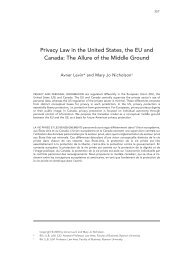Commentary on Fichte's “The Illegality of the Unauthorised ... - uoltj
Commentary on Fichte's “The Illegality of the Unauthorised ... - uoltj
Commentary on Fichte's “The Illegality of the Unauthorised ... - uoltj
Create successful ePaper yourself
Turn your PDF publications into a flip-book with our unique Google optimized e-Paper software.
168 university <strong>of</strong> ottawa law & technology journal www.<strong>uoltj</strong>.ca<br />
<strong>the</strong> illegality <strong>of</strong> <strong>the</strong> reproducti<strong>on</strong> <strong>of</strong> books. In that essay, Fichte said that <strong>the</strong><br />
reproducer <strong>of</strong> mechanical goods has a right to make a living. This right requires<br />
placing a limit <strong>on</strong> <strong>the</strong> property right in mechanical devices. 124 Only in this way<br />
can <strong>the</strong> right <strong>of</strong> <strong>the</strong> producer <strong>of</strong> mechanical devices be balanced with <strong>the</strong> right<br />
<strong>of</strong> <strong>the</strong> inventor to make a living by means <strong>of</strong> his mechanical inventi<strong>on</strong>. What does<br />
Fichte mean by <strong>the</strong> right to make a living? Fichte does not deal with intellectual<br />
property directly in <strong>the</strong> Foundati<strong>on</strong>s <strong>of</strong> Natural Right. But <strong>the</strong> author falls within<br />
a category <strong>of</strong> property rights holders which Fichte calls <strong>the</strong> “artists.” For Fichte,<br />
<strong>the</strong> social c<strong>on</strong>tract guarantees that <strong>the</strong> individual will always be able to survive<br />
based <strong>on</strong> her labour. In <strong>the</strong> case <strong>of</strong> artists, this means that <strong>the</strong> artist is guaranteed<br />
to be provided with <strong>the</strong> appropriate products necessary to produce her wares:<br />
“[T]he state must arrange things so that <strong>the</strong> artist, in exchange for all <strong>of</strong> his labor<br />
or articles, receives <strong>the</strong> quantity <strong>of</strong> products he needs in order to live during <strong>the</strong><br />
time that he is making <strong>the</strong> articles.” 125 As Fichte explains, m<strong>on</strong>ey is a sign <strong>of</strong> <strong>the</strong><br />
value <strong>of</strong> particular products. Thus, in <strong>the</strong> case <strong>of</strong> <strong>the</strong> author, <strong>the</strong> state must ensure<br />
that <strong>the</strong> author is able to earn enough m<strong>on</strong>ey so that she can live to c<strong>on</strong>tinue her<br />
labour (assuming that what she produces is desired by o<strong>the</strong>rs in <strong>the</strong> state). This<br />
means that <strong>the</strong> state must ensure that she can make m<strong>on</strong>ey through her efforts in<br />
order to buy what she needs—paper, pen, food, drink, lodging, clothing, etc. A<br />
regime that respects property rights in intellectual property is thus justified as a<br />
system <strong>of</strong> arrangements that guarantee that <strong>the</strong> author is able to receive m<strong>on</strong>ey<br />
in proporti<strong>on</strong> to <strong>the</strong> service that she is rendering to society. 126 While Fichte speaks<br />
mainly about <strong>the</strong> right <strong>of</strong> <strong>the</strong> reproducer <strong>of</strong> mechanical works to make a living, it<br />
is clear that, as an artist, <strong>the</strong> author, too, must have a means <strong>of</strong> earning a living<br />
from her trade. The copyright system is a means for ensuring that this is possible.<br />
To summarize, in this secti<strong>on</strong>, I have pointed out three <strong>of</strong> <strong>the</strong> ways in<br />
which Fichte’s article <strong>on</strong> <strong>the</strong> illegality <strong>of</strong> <strong>the</strong> reprinting <strong>of</strong> books differs from or<br />
foreshadows some <strong>of</strong> his later philosophical views. As we have seen, “Pro<strong>of</strong> <strong>of</strong><br />
<strong>the</strong> <strong>Illegality</strong> <strong>of</strong> <strong>the</strong> <strong>Unauthorised</strong> Reprinting <strong>of</strong> Books” seems to be c<strong>on</strong>sistent<br />
with Fichte’s early views about <strong>the</strong> c<strong>on</strong>tinuity between morality and legality, a<br />
view he later denied. I have also explained how Fichte’s view about <strong>the</strong> originality<br />
<strong>of</strong> <strong>the</strong> form <strong>of</strong> ideas presupposes some <strong>of</strong> his later epistemological views. Finally,<br />
as we have seen, Fichte’s intersubjective understanding <strong>of</strong> property requires that<br />
<strong>the</strong> state organize its intellectual property regime to ensure that authors are able<br />
to live from <strong>the</strong>ir trade. I turn now to a few brief c<strong>on</strong>clusi<strong>on</strong>s.<br />
*<br />
10. CONCLUSION: THE ORIGINALITY OF FICHTE’S VIEWS<br />
For Fichte, creative works express <strong>the</strong> individuality <strong>of</strong> <strong>the</strong>ir creators, and <strong>the</strong><br />
recogniti<strong>on</strong> <strong>of</strong> this individuality, which forms <strong>the</strong> basis <strong>of</strong> Fichte’s later intersubjective<br />
<strong>the</strong>ory <strong>of</strong> legal rights, entails <strong>the</strong> recogniti<strong>on</strong> <strong>of</strong> a property interest in creative<br />
works. Or to use Vaver’s words to articulate Fichte’s <strong>the</strong>ory, Fichte recognizes that<br />
124. Fichte, <strong>“The</strong> <strong>Illegality</strong> <strong>of</strong> <strong>the</strong> Reproducti<strong>on</strong> <strong>of</strong> Books,” supra note 53 at para. 22.<br />
125. Fichte, Foundati<strong>on</strong>s <strong>of</strong> Natural Right, supra note 1 at p. 204.<br />
126. Fichte emphasizes <strong>the</strong> importance <strong>of</strong> <strong>the</strong>re being an exact balance between raw products received by <strong>the</strong><br />
artist and finished articles produced. Fichte, Foundati<strong>on</strong>s <strong>of</strong> Natural Right, supra note 1 at p. 204.









